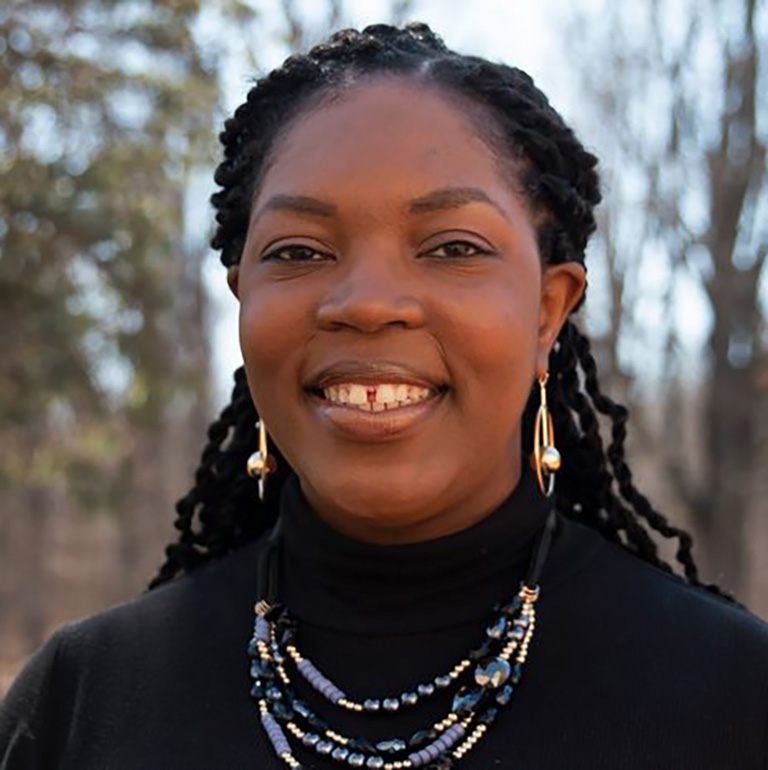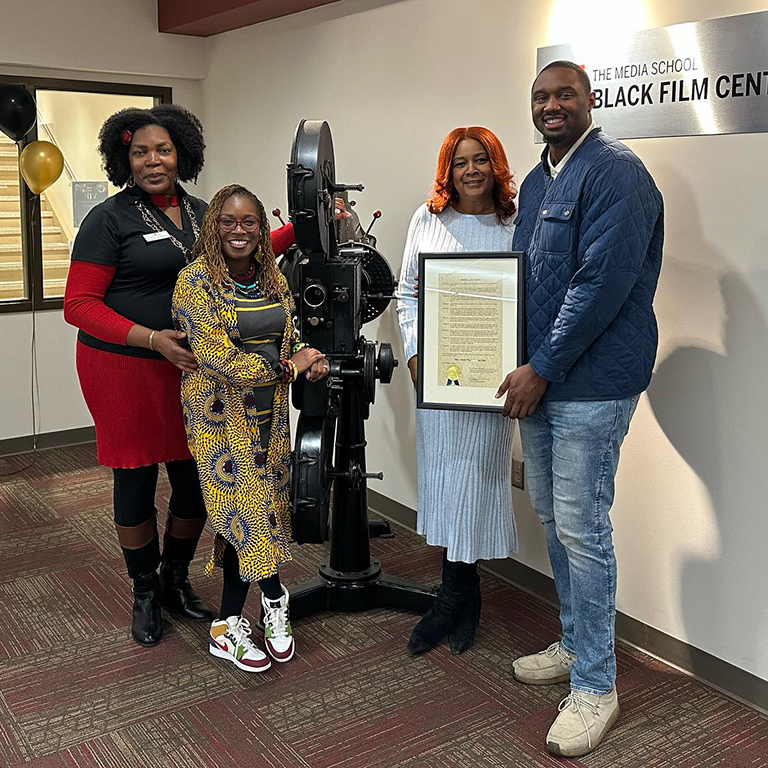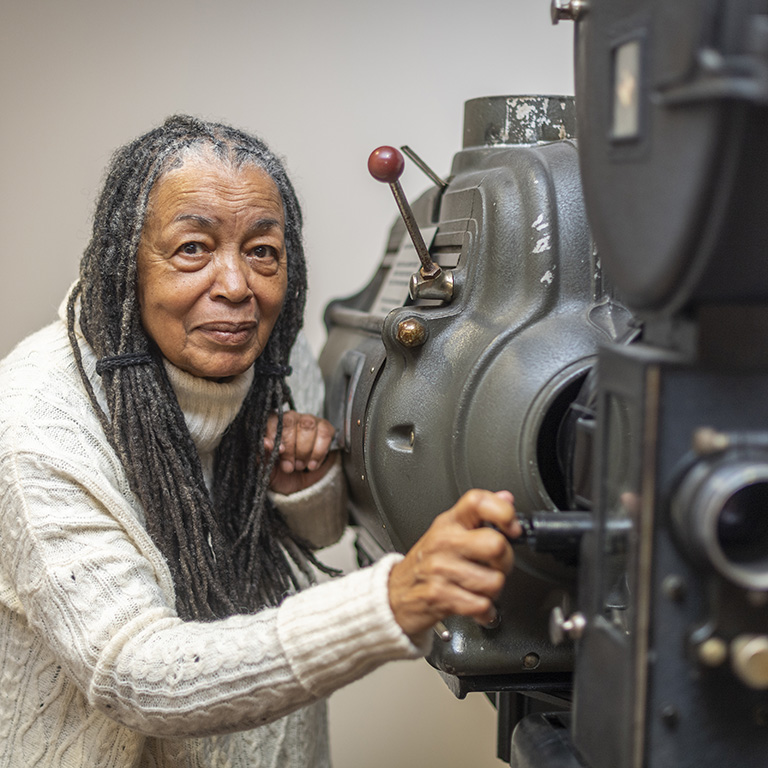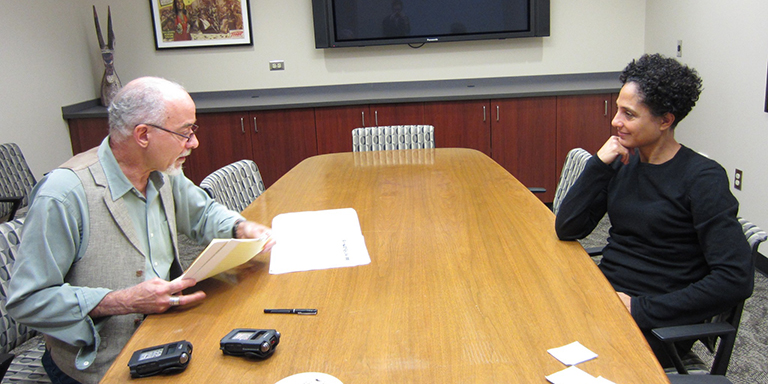July 15, 2024
Since its founding in 1981, the Black Film Center and Archive has served as an archival home for artifacts, papers, and ephemera tracing the histories of Black people’s contributions to cinema.
Since its founding in 1981, the Black Film Center and Archive has served as an archival home for artifacts, papers, and ephemera tracing the histories of Black people’s contributions to cinema.
Under the direction of founder Phyllis Klotman, the BFCA sought to address the underrepresentation and absence of Black voices within film history and curricula, while creating a Midwestern hub for Black cinema resources.
Now situated in Wells Library, as a part of the Media School, the BFCA endeavors to:
Learn about Black Camera, an international film journal published through the BFCA and IU Press
In this edition of Into the Arts, BFCA finance and office administrator Ja Quita Joy Roberts and archivist Dan Hassoun offer insight into what the center and archive means to them and to communities near and far.


Could you name a piece or two from the BFCA collections that you’ve been loving lately? Why is this media special to you?
Joy Roberts: The Jessie Maple and the Bridgett Davis Collections hold an extra special place in my heart. Both of those collections have had restorations completed and debuted, in this last year (Will, 1981 and Naked Acts, 1996). I was fortunate enough to get to know both of those filmmakers really well and become like family with them and their materials. The relationships built add to the motivation and passion to continue the work that we do. Making sure many more people can see these amazing films and special items for hundreds and hundreds of years into the future is simply incredible to even think about, in so many ways.
Dan Hassoun: Our Jessie Maple Collection has received a special spotlight this year. Ms. Jessie Maple, who sadly passed away last summer, was an independent filmmaker based in Harlem, whose 1981 film Will is recognized as one of the earliest features directed by a Black American woman. Will received only a few screenings during its initial release and has never been commercially available. In 2005, Ms. Maple donated her original print of Will to the BFCA, which formed the basis for a new 4K restoration this year with support from the Smithsonian National Museum of African American History & Culture. The restoration debuted at the IU Cinema this past February 1 with Ms. Maple's family in attendance and Mayor Kerry Thomson officially declaring the occasion Mrs. Jessie Maple Patton Day in Bloomington. Restorations like this highlight the crucial work done by archives like the BFCA to preserve historically important films that otherwise may be lost to obscurity. It is so important for our cultural heritage and understanding of film history that the output of artists like Ms. Maple remains accessible even without the support of deep-pocketed studios and distributors.


What is an element of your work that feels particularly meaningful to you?
Joy Roberts: As the finance and office administrator, it’s an honor to make sure amazing events can be executed flawlessly, acquisition and supply purchases can be completed easily, guests can arrive safely and have a wonderful time, technology available and working properly, among so much more. Each role, responsibility, and hat that I wear remains to be a critical component of the operations of the Black Film Center & Archive. Every aspect of what I do means so much to me because I love the BFCA and want it to thrive well into the future!
Dan Hassoun: One of the most gratifying parts of my work is when I'm able to reunite independent filmmakers with copies of their own work. Film is a fragile medium, and I don't think we realize how easily even filmmakers can lose access to their own work over time (due to a combination of decay, misplacement, and obsolescent technology). It is not uncommon for filmmakers to reach out to us for an unrelated research or footage question, only for us to discover that we hold copies of their old films here! Many of the films in our collections have been digitized, so it's usually quite easy to send the filmmaker a file of their work. It feels like reuniting a parent with their child.



Left: Novotny Lawrence, director of the BFCA, meets with filmmaker and director, Ira Mallory, who donated materials, making the BFCA his archival home. Top: In 2013, filmmaker Shola Lynch visited as a keynote presenter for the Regeneration conference on early Black film, during which she sat for a recorded interview with then-BFCA director Michael T. Martin. Bottom: The BFCA team, including past directors, celebrates Ja Quita Joy Roberts’s tenth year with the BFCA.
How do you see the BFCA bridging the history and future of Black film?
Joy Roberts: In my ten years of working at the BFCA, I’ve had the pleasure of welcoming guests to the BFCA from all over the world! Almost everyone says that they need more time and will return for additional visits. The BFCA was founded in 1981 and to date is still the only repository in the world that is solely dedicated to the collection and preservation of all things surrounding Black cinema. We are always actively acquiring amazing historical items, while also pursuing current/new items to add to our collection. When we talk about bridging the history and future of Black film, we will fortunately be in that conversation for many years to come! There are so many items that are in our collections that don’t exist anywhere else in the world. The BFCA will continue to connect researchers, scholars, filmmakers and the community to these materials. We are honored to be the stewards of these important legacies and carry the weight of this work, for those that came before us and those still to come.
Dan Hassoun: The BFCA's collections testify to the breadth and scope of global Black filmmaking since the earliest days of motion pictures. These items tell stories about the shifting meanings of Blackness and racial representation onscreen over the past 120+ years, as well as the resilience of thousands of BIPOC creators who have worked within and outside of film industries that frequently marginalize them. I'm struck by how often we can see echoes of today's struggles around race within films from 20, 50, or 70 years ago. The future emerges from the past, and it's important that filmmakers working today regularly engage with the legacies of those who have grappled with similar themes.